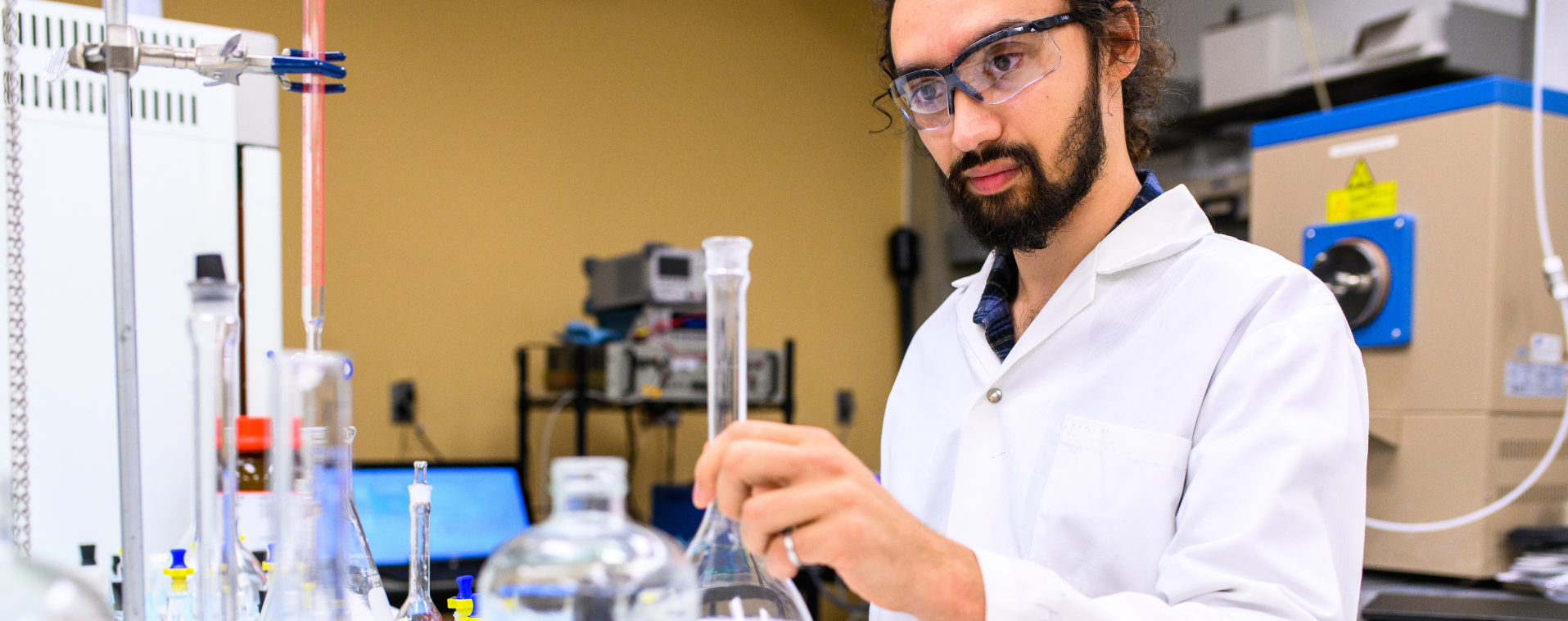As someone born and raised in Calgary, Keith Cleland initially thought he would end up working in the oil industry. “Being from Alberta, that seemed like the natural thing to do,” he says.
However Cleland decided to follow a different path and work for a sustainable future instead. “I really want to be contributing to sustainability, cleaning the world up and transitioning the world away from fossil fuels.”
He switched his undergraduate minor to energy and environmental engineering and later began researching a battery that would use a cheap and available resource — saltwater— to store renewable energy. Cleland continued developing his technology as part of his master’s in chemical engineering at the University of Waterloo where he met Ellsworth Bell (MASc ‘21), a classmate working in the same lab. Together, they founded Aqua-Cell Energy Inc. with plans to commercialize a saltwater battery.
The company recently accepted a coveted residence through Venture Ready at Waterloo’s Velocity, which helps the founders of early-stage companies get the expertise and connections they need to make their businesses a success. Aqua-Cell Energy has also won several pitch competitions including the Concept $5K through Velocity in 2020, the GreenHouse Social Impact Fund in 2021 and the $15K Problem Pitch in 2022.
Although solar technology has dramatically come down in price over the years, Cleland explains that lithium batteries are expensive to store a lot of excess energy. This costly energy storage is a barrier to clean energy adoption. If excess solar energy on sunny days could be stored and used to lower energy costs in the evening when electricity is most expensive, or on cloudy days, renewable energy would become much more cost-effective, attractive and widespread.
Cleland hopes to make that happen with Aqua-Cell Energy’s technology.
Although the idea has been around for some time, previous technology to do this was not that efficient. So when Cleland realized excess renewable energy could be stored in a saltwater battery, he set out to make the process commercially viable. He proposed the project to professor Anne Benneker at the University of Calgary and professor Jeff Gostick, his master’s supervisor at Waterloo. Cleland says both have been meaningful mentors for the project.
In Gostick’s lab at Waterloo, Cleland developed a prototype for a much more efficient energy storage battery. He has tested the prototype and proven that it works well in the lab. It uses salt that is cheap and can be mixed with water in tanks.
In 2020, Aqua-Cell Energy has been working with Velocity student supports when they applied to the Problem Lab’s Problem Pitch. This is a competition that invites teams to thoroughly research an important industry problem and pitch findings to a panel of judges for funding to support their venture. They were successful in winning the pitch in winter 2022 after being a finalist in spring 2021. Through Velocity Cornerstone, Aqua-Cell Energy was able to identify their customers and target market.
Now, with the help of Velocity, Aqua-Cell Energy is moving forward with a pilot project and is seeking grants to help them scale. “We are in the phase of scaling up the technology to store a lot more energy. We know it works in the lab but now we need to scale it up and build confidence in the technology.”
Cleland aims to sell Aqua-Cell Energy’s batteries to renewable energy developers and industrial facilities who utilize solar energy such as having solar panels on their roofs, or businesses that operate fleets of electric vehicles and want to use more of the solar power they generate on site.
Although Aqua-Cell Energy will initially focus on the solar energy storage market, Cleland says the battery could be used to store wind energy or clean, low cost hydroelectricity from the grid overnight as well.
Eventually, if the battery can be developed for use on an even larger scale, hydro companies might be interested. Right now, the operators of electricity grids have a problem known as curtailment. This happens when there is more clean energy being produced than can be safely stored, which means the energy has to practically be given away to neighbouring jurisdictions at prices far below what it costs to produce it. Better energy storage would save them a considerable amount of money.
Cleland says working with Velocity will be a huge boost for Aqua-Cell Energy. “We need to grow our team and develop relationships with potential customers. Velocity is providing a space we can work out of and will be helping us as we get in touch with people who face this problem of expensive energy storage. The mentorship will be incredibly helpful,” he says.
Cleland is passionate about contributing to a cleaner environment.
“I believe we have the power to reduce fossil fuel emissions and be a catalyst for improving solar energy adoption. Expensive energy storage is a huge problem right now, but if we can bring those costs down and boost solar adoption, then we have a possibility to change the world.”

